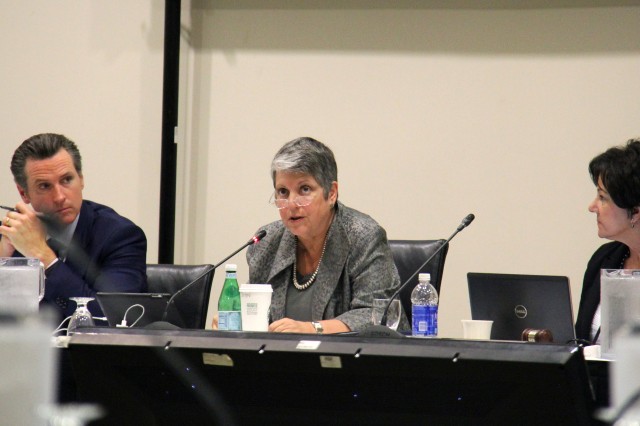UC commits $3.3 million to food access in response to survey results

Napolitano announced $3.3 million in funding for campuses to reduce food insecurity and increase access to nutritious food. (Emaan Baqai/Daily Bruin senior staff)
By Ryan Leou
July 12, 2016 3:56 p.m.
The University of California released the results of an online survey on food security Monday that found 19 percent of respondents had “very low” food security. Another 23 percent said they had “low” food security.
In response, UC President Janet Napolitano announced Monday campuses will have access to $3.3 million in new funding over the next two years to help students regularly access nutritious food on campus and off, according to a press release.
About 9,000 students participated in the survey, which the UC thinks is the largest study of food security in undergraduate and graduate students in the United States.
Food security, as defined by the United States Department of Agriculture, can be described as “high”, “marginal”, “low” and “very low”. Those with low food security reported reduced quality or variety of diet but little or no reduction of food. Those with very low food security reported multiple occasions of going without or eating less food.
Each UC campus will receive $151,000 in addition to a $75,000 grant Napolitano awarded last year as part of the Global Food Initiative to help students access nutritious food.
“We undertook this survey and are acting on its findings, because the University is serious about addressing real, long-term solutions to improve the well-being of our students,” Napolitano said in a statement
The survey found differences in food security by race, family history with food insecurity and education level. The survey also found food insecurity harmed a student’s ability to perform well academically.
Twice as many Hispanic respondents said they were food insecure than secure. Similarly, 1.5 times more African-American students said they were food insecure than secure.
The survey found about 40 percent of respondents who said they were food insecure said they were also food insecure while growing up. Food insecure students were also three times more likely to suspend their studies due to financial hardship and 1.5 times more likely to receive financial aid.
Undergraduate students were almost twice as likely to be food insecure as graduate students.
Food insecure students self-reported a mean grade point average of 3.1, compared to 3.4 for food secure students. Students who said they had difficulty studying because of hunger and lack of access to food made up about 13 percent of food insecure students.


